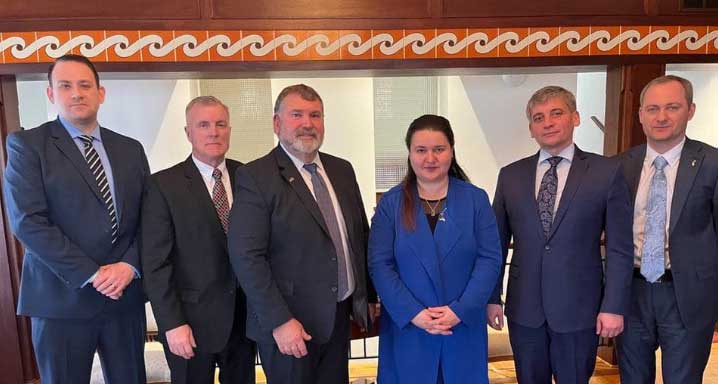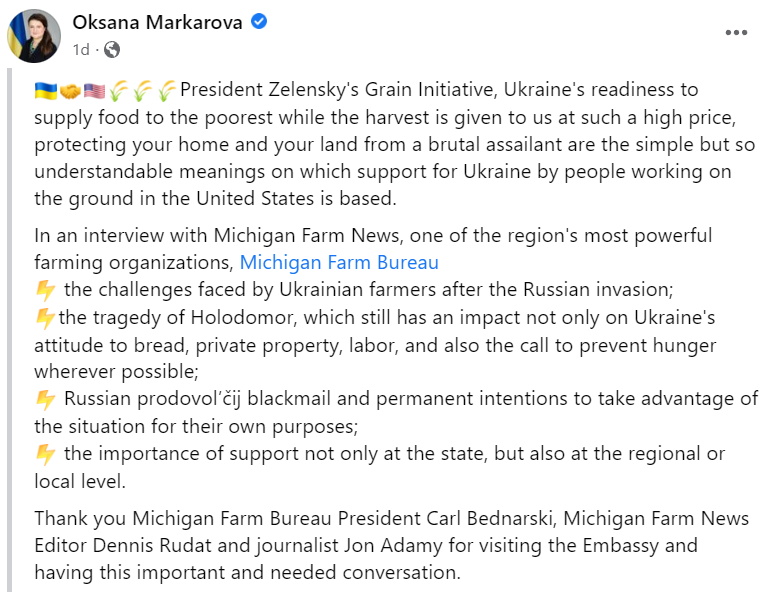
Death by hunger.
It’s a concept that’s all but unfathomable for Americans.
For Ukrainians, it’s so engrained in their history that it has its own word — Holodomor — referring to the intentional starvation of millions of Ukrainians through a man-made famine as a result of Soviet policies in 1932-33.
Ukrainian Ambassador to the U.S. Oksana Markarova remembers when just talking about the Holodomor was strictly banned during the Soviet era.
“It was the days when there were hundreds or thousands of people dying, just dropping dead on the streets,” Markarova told Michigan Farm Bureau President Carl Bednarski at the Ukrainian Embassy during MFB’s Washington Legislative Seminar.
“Imagine parents who saw their children die from hunger, in the country that was called the breadbasket of Europe.”
The lobby of the Ukrainian Embassy has just one painting on the wall: A simple field of wheat, with a message on the side remembering the “artificial hunger” Ukrainians endured in the Holodomor.
Ghosts of war, pain and hunger at the hands of Russian aggressors are haunting Ukraine again.
But, as Markarova said, the war being fought today started in 2014 when Russia attacked three regions of Ukraine, including Crimea.
“It’s not something new, unfortunately, for us,” she noted.
“It was contained regionally — it wasn’t a full-fledged war. For the past eight years, we tried to resolve that situation through diplomatic means.”
That all changed with what Markarova called the “re-invasion” in February 2022.
While Ukrainian citizens defend the frontlines against wave after wave of Russian soldiers, farmers there are also fighting, not only to feed their country, but continue to export grain despite immeasurable challenges.
Challenges including farming ground that’s been littered with land mines.
“Even in the liberated territories, there is this danger in the fields,” Markarova said, noting that one month of war typically requires one year of clearing mines.
“We hear heart-wrenching stories of farmers trying to do it on their own and blowing up in the fields because, you know, it has to be done by the professionals.”
According to Ukraine’s preliminary estimates, nearly 471,000 hectares (about 1.2 million acres) of agricultural land require humanitarian demining — the most area of any country on earth.
Despite the mines, and the missiles, and the constant Russian shelling of Ukraine’s ag infrastructure, farmers are still harvesting enough grain to be able to export it to countries that are facing hunger. Places including Ethiopia, Nigeria, South Sudan, Yemen, Afghanistan and Somalia depend on Ukrainian grain to feed their people.
Somalia has also received donations through the humanitarian Grain From Ukraine program, which sends grain to places which need it most, with the goal of providing grain to at least 5 million people by the end of this spring.
“It's better for food to be used for the good cause than to be destroyed by the Russian missile — because they specifically target storages and services,” Markarova said.
“So much crop was destroyed because they specifically attacked the places where it’s stored.”
More than 90% of Ukraine’s ag exports go through the Black Sea, which is being currently under Russian control. A fragile deal brokered by the United Nations and Turkey has allowed for more than 25 million metric tons of Ukrainian grain to get safe passage through Black Sea ports, but Ukraine claims Russia is intentionally slowing down cargo ship inspections, leading to major backlogs.
The latest extension to the grain agreement came on March 18, but Russia is already threatening not to renew the deal again if Western sanctions aren’t lifted.
“I mean, thank God we have this limited grain initiative that allows to get something out, but it's not what it was before of course,” Markarova said.
She knows a thing or two about what farming used to be like in Ukraine, having spent summers in high school at her grandparents’ farm. Her children are still surprised that she knows how to milk a cow, among other “untraditional skills” for young people, as she put it.
“With regard to farmers, I mean, Ukrainians, you know, this is who we are,” Markarova said.
“This is in our DNA.”
Before the war, Ukraine’s annual agricultural exports totaled $27.8 billion — 41% of the country’s total exports.
Ukraine’s sown area is expected to decrease by 7 million hectares in the upcoming farming season — partially fueling more than $34.25 billion losses in the ag sector of Ukraine’s economy that’s resulted from Russia’s invasion.
Still, Markarova is optimistic.
Farmers in 10 regions of Ukraine have already started planting, which is an improvement over the same time period in 2022.
“Despite the fact that it has been more than a year of full-fledged war and our farmers live under enormous, difficult situations, they do what they like to do,” Markarova said.
“You know, life continues.”
Bednarski, who farms in Tuscola County, said the conversation with Markarova is a reminder of the freedoms and luxuries we have in the U.S.
“Here we are in Washington, D.C., where everybody is free and knows where their next meal is coming from — well in Ukraine that’s not the case,” Bednarski said.
“Farmers there are still going out there and risking their lives to sow that seed for people all around the world so the less fortunate have something to eat.”
Markarova hopes that with continued support from the U.S., European Union, and “the free world,” Ukraine can get more capabilities to get the Russians out faster.
“Maybe even this agricultural season will be finished not in war, but in peace,” Markarova concluded.
"And it's going to be the best gift for our farmers.”
Ukraine has established an online platform, United24, for those wishing to donate to help their ongoing efforts to withstand Russia’s invasion. Donations can be made toward defense and demining, medical aid, and rebuilding Ukraine. More information is available here.
Donations can also be made to Ukraine House, which is a “home away from home” for Ukrainians in Washington, D.C., that also supports humanitarian efforts. Click here to learn more.
Markarova also noted that anyone wishing to send letters of support to Ukrainian farmers can send them directly to the embassy, at 3350 M Street N.W., Washington, D.C., 20007.



